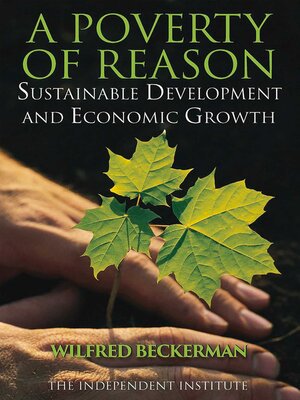
Sign up to save your library
With an OverDrive account, you can save your favorite libraries for at-a-glance information about availability. Find out more about OverDrive accounts.
Find this title in Libby, the library reading app by OverDrive.



Search for a digital library with this title
Title found at these libraries:
| Library Name | Distance |
|---|---|
| Loading... |
Environmental activists, politicians and celebrities have touted the wisdom of "sustainable development" as though its meaning and value were clear. But the concept has barely been defined, let alone subjected to scientific, economic, and philosophical scrutiny.
Oxford University economist Wilfred Beckerman puts "sustainable development" to the test, questioning several of its core claims: Will economic growth burn itself out by depleting the natural resources it requires? Will global warming wreak widespread havoc? Does human activity threaten to throw a delicate planet dangerously "out of balance"? Do future generations possess rights that morally override the claims of those alive today? At what price?
After examining the evidence, Beckerman finds "sustainable development" lacking on both scientific and moral grounds. Although millions of people lack clean air and water, and are plagued by deteriorating ecosystems, these problems are caused not by "unsustainable development" but by poverty, poorly defined property rights, and lack of freedom of opportunity. And, Beckerman concludes, because "sustainable development" recommends policies that would worsen these conditions (for present and future generations), it hardly occupies the moral high ground, as its supporters claim.
A Poverty of Reason provides a critical examination of this highly controversial topic and will prove essential in the ongoing debate about environmental and economic practices.
Oxford University economist Wilfred Beckerman puts "sustainable development" to the test, questioning several of its core claims: Will economic growth burn itself out by depleting the natural resources it requires? Will global warming wreak widespread havoc? Does human activity threaten to throw a delicate planet dangerously "out of balance"? Do future generations possess rights that morally override the claims of those alive today? At what price?
After examining the evidence, Beckerman finds "sustainable development" lacking on both scientific and moral grounds. Although millions of people lack clean air and water, and are plagued by deteriorating ecosystems, these problems are caused not by "unsustainable development" but by poverty, poorly defined property rights, and lack of freedom of opportunity. And, Beckerman concludes, because "sustainable development" recommends policies that would worsen these conditions (for present and future generations), it hardly occupies the moral high ground, as its supporters claim.
A Poverty of Reason provides a critical examination of this highly controversial topic and will prove essential in the ongoing debate about environmental and economic practices.







